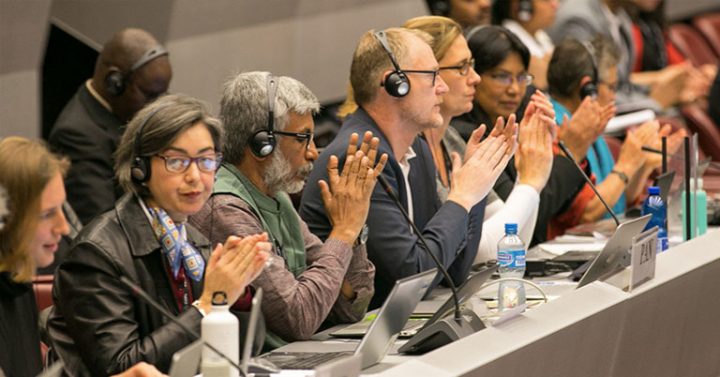PAN welcomes the positive outcomes and discussions during the Triple Conferences of the Parties (COPs) to the Basel, Rotterdam and Stockholm (BRS) conventions which took place in Geneva, Switzerland from April 24 to May 5, 2017.
PAN is pleased that two pesticides, carbofuran and trichlorfon, were listed in the Annex III of the Rotterdam Convention. The listing comes as a huge step forward in addressing the numerous cases of poisoning of people and wildlife brought about by these pesticides.
Pesticides listed in Annex 3 of the Rotterdam Convention will be subject to a procedure (Prior Informed Consent Procedure) whereby an informed decision of a country would be needed before a country gives consent or not for future importation of the pesticide. Listing does not constitute a ban. It opens avenues for developing countries to build their capacity to evaluate pesticides and adopt agroecological strategies in managing pests.
PAN Asia Pacific (PANAP) Executive Director, Sarojeni Rengam also welcomed the serious discussion of gender issues in the Triple COPs.
“As the impact of chemicals on the health of women and children is too often ignored, involving women in decision making and in programmes to reduce highly hazardous pesticides and to replace them with agroecology is essential.
“We need policies to support women’s leadership in all levels and programmes to strengthen their capacity,” said Rengam, who is also a 2017 Gender Pioneers awardee.
Despite the positive outcomes, PANAP Senior Science Advisor Dr. Meriel Watts, is however disappointed that civil society organisations (CSOs) such as PAN, were excluded from important discussions on the effectiveness of the Rotterdam Convention.
“As CSOs, we have much to contribute and we hope that CSOs will be included in future discussions on this issue,” she said.
There was also disappointment when no consensus was reached on the listing of carbosulfan and pesticide formulations paraquat dichloride and fenthion in Annex 3 of Rotterdam Convention even though the Parties agreed they met the criteria for the listing.
“Rotterdam facilitates information sharing and so we urge those countries who blocked the inclusion of carbosulfan, and the two pesticide formulations, paraquat and fenthion, in the list to go to fields and plantations and see the real impact of these chemicals on the health of workers, farmers and their communities and the environment and not just look at its narrow economic benefits,” said Rengam.
PAN further calls upon all Parties to the Conventions to act on the State of Palestine’s request for assistance with the removal of and the monitoring and prevention of illegal traffic of banned pesticides and chemical wastes in the Israeli-occupied West Bank Region.
Dr.Watts reiterated, “A programme for monitoring and clean-up in this region is desperately needed.”
In parting, Dr.Watts said, “We welcome the COPs recognition of the need to link human rights and sound management of chemicals and waste, and thus, we strongly suggest specific discussion on this is included in the next BRS agenda.”
###
Contacts:
Sarojeni Rengam – sarojeni.rengam@panap.net
Dr.Meriel Watts – meriel@merielwatts.net








Discussion about this post